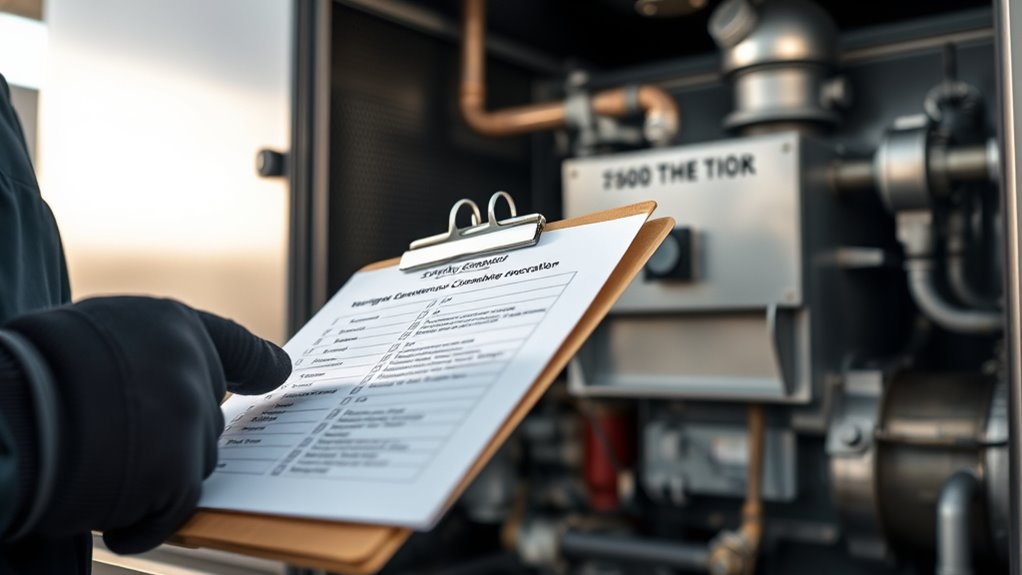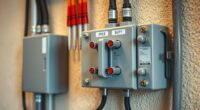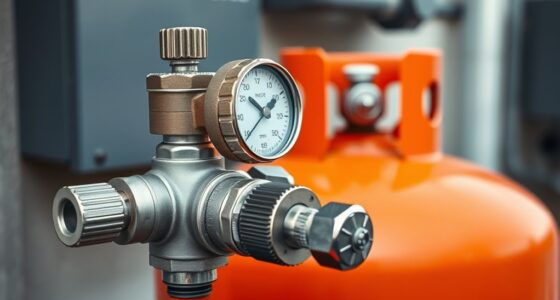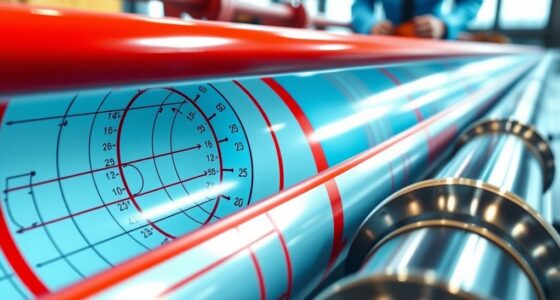Before starting your standby generator, calculate your fuel needs by understanding its consumption rate based on load and runtime. Regularly monitor fuel levels and efficiency to catch any issues early. Guarantee proper maintenance, like changing filters and checking spark plugs, as this helps reduce fuel use and extend your generator’s life. By keeping these factors in mind, you’ll be prepared—and if you continue, you’ll learn more tips to optimize your fuel management.
Key Takeaways
- Calculate fuel consumption rate based on generator load and runtime to estimate fuel needs accurately.
- Ensure fuel quality and proper storage to optimize combustion efficiency and prevent waste.
- Regularly inspect and maintain generator components to sustain optimal performance and fuel efficiency.
- Monitor fuel levels and usage patterns to detect efficiency declines and schedule timely maintenance.
- Use efficiency data and generator load management to plan fuel supply and minimize operational costs.
Understanding Your Generator’s Fuel Consumption Rate

Understanding your generator’s fuel consumption rate is essential for planning and efficient operation. Knowing your generator’s fuel capacity helps you estimate how long it can run on a full tank, ensuring you’re prepared for outages. Different fuel types, such as gasoline, diesel, or natural gas, influence how much fuel your generator uses and how often you need to refuel. Each fuel type has its own efficiency and burn rate, which directly impacts your generator’s runtime. By understanding these basics, you can better manage fuel supplies and avoid unexpected shutdowns. Monitoring fuel consumption also helps you optimize performance and plan maintenance schedules. Additionally, understanding your generator’s fuel efficiency is crucial for maximizing runtime and minimizing costs. Ultimately, having a clear grasp of your generator’s fuel needs keeps your backup power reliable and ready when you need it most.
Factors That Affect Fuel Usage During Operation
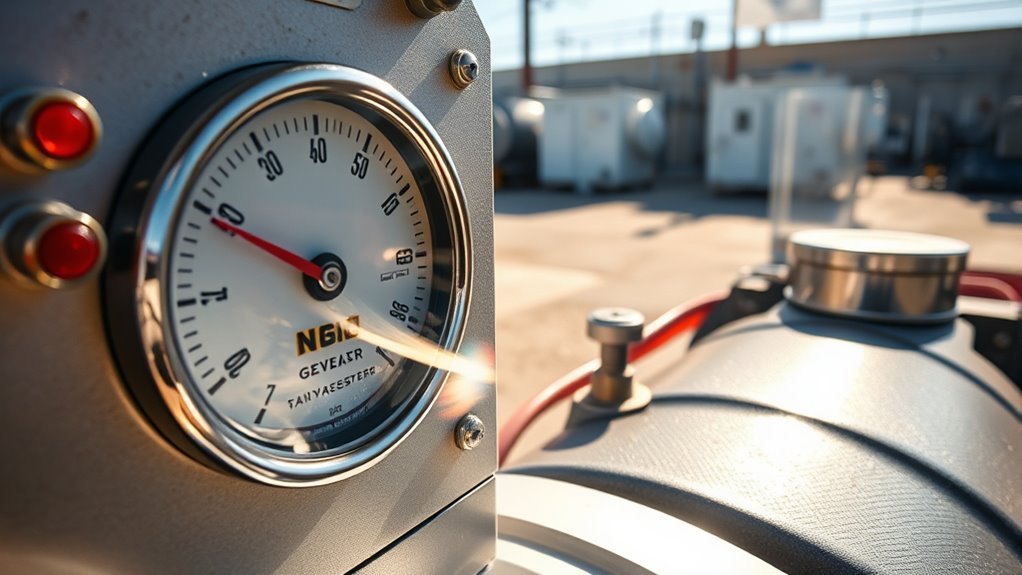
Your generator’s fuel usage isn’t just about running time; it’s influenced by factors like load demand, fuel quality, and how well you maintain it. When demand fluctuates, your fuel consumption can spike or drop unexpectedly. Additionally, poor fuel or skipped maintenance can make your generator less efficient, increasing fuel needs. The use of high-quality projectors can also impact energy efficiency during extended operation.
Load Demand Variability
Have you ever wondered why a generator’s fuel consumption fluctuates even when running at the same load? Load demand variability plays a significant role. When demand spikes unexpectedly, your generator works harder, increasing fuel use and affecting overall efficiency. Conversely, lower demand reduces fuel consumption, but frequent fluctuations can make it hard to predict costs. This variability also impacts fuel pricing, as more unpredictable consumption can lead to higher expenses. Additionally, increased fuel use contributes to environmental impact through higher emissions. Understanding these fluctuations helps you better manage your generator’s operation and costs. By monitoring load demand patterns, you can optimize fuel efficiency, reduce unnecessary expenses, and lessen environmental footprint, ensuring your standby generator runs smoothly and responsibly.
Fuel Quality Impact
Fuel quality directly impacts how efficiently your generator operates because poor-quality fuel can cause incomplete combustion, leading to higher fuel consumption. Contaminants like water or dirt, or degraded fuel from improper storage considerations, reduce efficiency. To improve fuel quality, consider:
- Using fuel additives that prevent phase separation and stabilize fuel during storage.
- Storing fuel in airtight containers, away from heat and sunlight, to prevent degradation.
- Regularly inspecting and rotating stored fuel to avoid stale or contaminated supplies.
- Employing proper maintenance practices to ensure your generator functions at peak performance.
High-quality fuel minimizes combustion issues, ensuring your generator runs smoothly and efficiently. Proper storage and the right fuel additives are essential for maintaining optimal fuel quality, ultimately reducing unnecessary fuel consumption during operation.
Maintenance and Tuning
Proper maintenance and tuning are vital for ensuring your generator operates efficiently and consumes the right amount of fuel. Regularly check and adjust engine components like air filters, spark plugs, and fuel injectors to optimize performance. Using fuel additives can improve fuel combustion and prevent deposits that cause inefficiency. Additionally, maintaining proper fuel storage safety is essential; stale or contaminated fuel increases consumption and risks damage. Keep your fuel tanks clean, sealed, and stored in a cool, dry place to prevent deterioration. Tuning your generator correctly minimizes unnecessary fuel use, reduces emissions, and extends its lifespan. Properly calibrating your engine’s headphone jacks and connections can also contribute to more efficient operation. Consistent maintenance and proper fuel handling ensure your generator runs smoothly, saving you money and avoiding avoidable breakdowns.
Calculating Fuel Needs Based on Load and Runtime

To determine how much fuel you’ll need, you first estimate your generator’s fuel consumption rate based on the load you’re running. Then, you can calculate the total fuel needed by multiplying that rate by your planned runtime. This straightforward approach helps guarantee you have enough fuel for your specific power demands. Additionally, understanding inverter generator efficiency can help optimize fuel use and extend runtime.
Estimating Fuel Consumption Rate
Have you ever wondered how much fuel a generator will need for a specific job? To estimate this, you need to understand its fuel consumption rate, which depends on load and runtime. First, determine the generator’s fuel efficiency, usually expressed in gallons per hour at a given load. Next, consider your expected runtime and load level: higher loads burn more fuel, increasing costs. Third, factor in fuel pricing to estimate expenses accurately, especially if fuel storage is limited. Keep in mind that:
- Fuel consumption varies with load and runtime.
- Accurate estimates help manage fuel storage effectively.
- Knowing your fuel pricing allows better budgeting for maintenance and operation.
Determining Total Fuel Needed
Once you know your generator’s fuel consumption rate at a specific load, calculating the total fuel needed becomes straightforward. You’ll need to determine how long the generator will run during a power outage. Multiply the consumption rate by the desired runtime to find the total fuel required. This helps you assess your fuel tank capacity and verify adequate fuel storage. If your generator consumes 0.5 gallons per hour at a certain load, and you expect it to run for 10 hours, you’ll need 5 gallons of fuel. Make sure your fuel tank can hold this amount or plan for additional fuel storage to cover unexpected longer runtimes. Accurate calculations prevent running out of fuel during critical times, ensuring reliable backup power. Additionally, understanding your generator’s fuel efficiency can help you optimize your fuel planning and avoid unnecessary refueling during emergencies.
Monitoring Fuel Efficiency Over Time
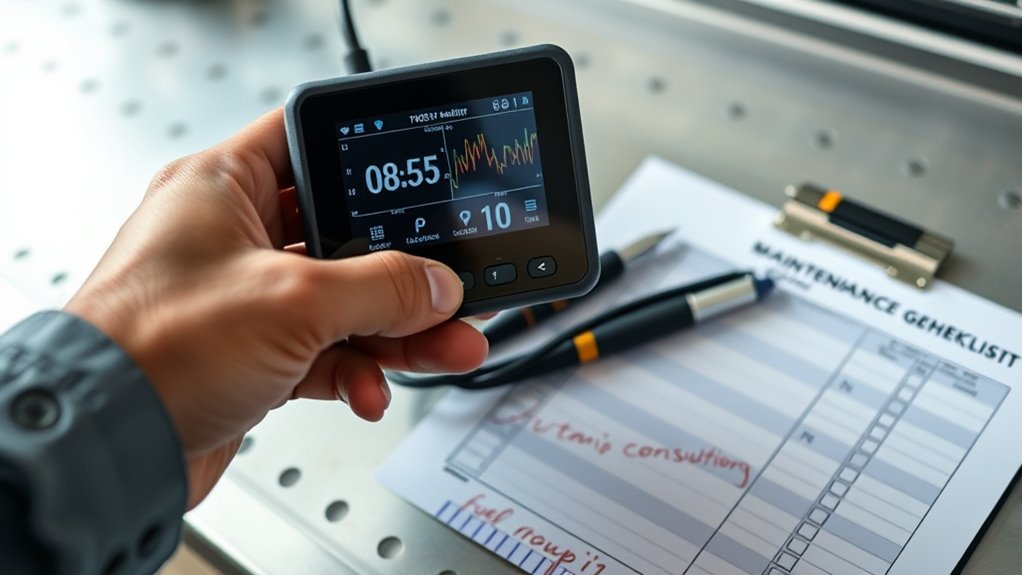
Monitoring fuel economy helps you spot declining efficiency, which could indicate underlying problems. To do this effectively, consider:
- Recording fuel consumption regularly and comparing it against your generator’s tank capacity.
- Tracking how many hours the generator runs per fuel fill to assess efficiency.
- Noticing patterns or changes in fuel use that might signal the need for maintenance or adjustments.
- Incorporating well-being tips to maintain optimal generator performance and prolong its lifespan.
The Impact of Maintenance on Fuel Consumption
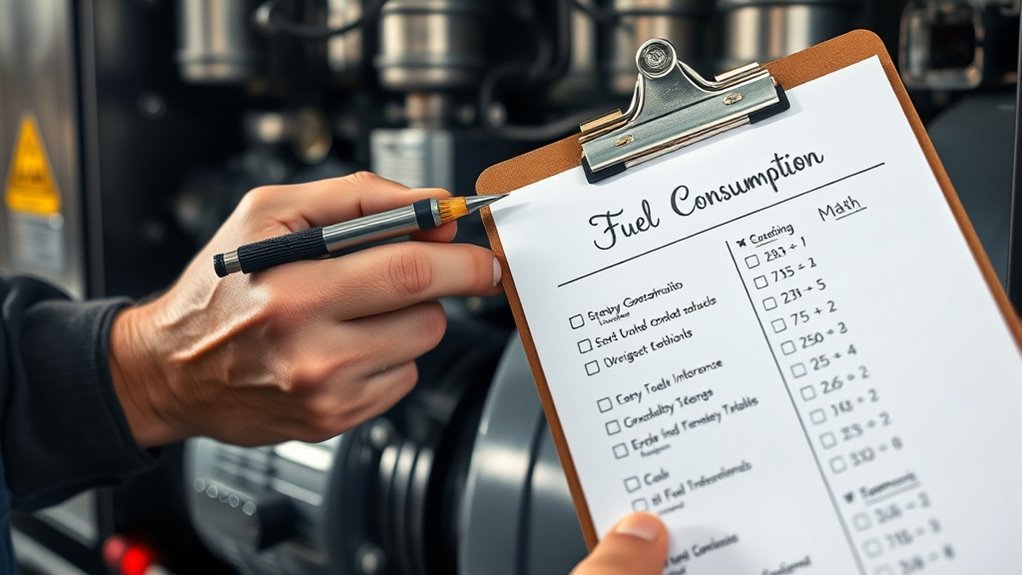
Regular maintenance plays a crucial role in maximizing your generator’s fuel consumption; neglecting it can lead to increased fuel use and reduced efficiency. When you stick to proper maintenance scheduling, you ensure all parts operate smoothly, reducing stress on the engine and improving fuel efficiency. Dirty filters, worn spark plugs, or clogged radiators force the engine to work harder, wasting fuel. Regular inspections and timely repairs help catch issues early, preventing unnecessary fuel consumption. Well-maintained generators run more efficiently, saving you money and extending equipment lifespan. Consistent maintenance not only keeps your generator reliable but also minimizes fuel waste, ensuring you get the most out of each gallon. Prioritizing maintenance scheduling is key to controlling fuel costs and maintaining peak performance. Additionally, paying attention to maintenance checklist details can help identify potential problems before they escalate, further enhancing fuel efficiency.
Practical Tips for Managing Fuel Consumption Effectively
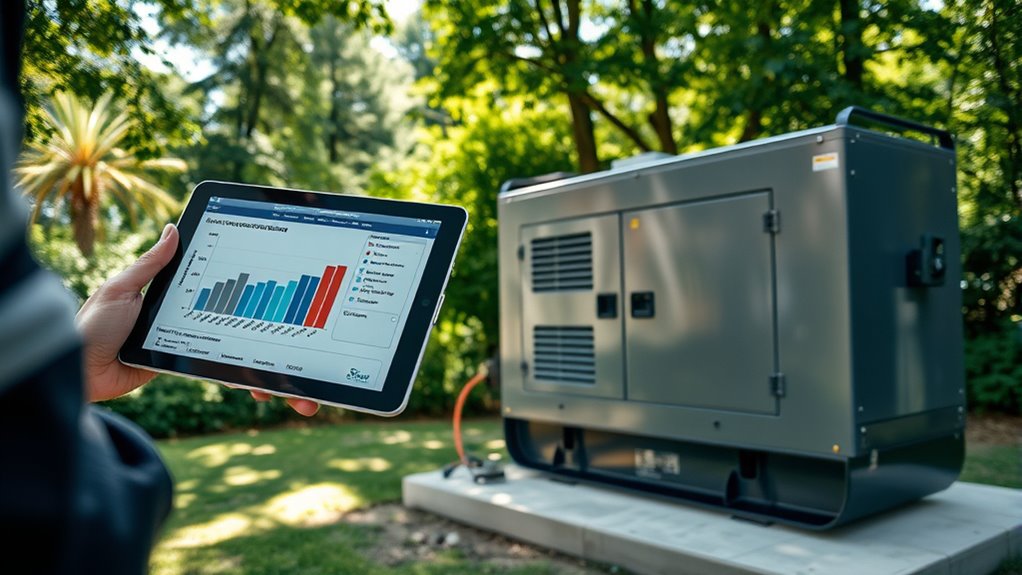
To manage your generator’s fuel consumption effectively, start by operating it within its ideal load range. Running it at the most efficient load reduces fuel cost and prevents unnecessary wear. To improve efficiency, consider these practical tips:
- Regularly monitor fuel levels to avoid overfilling, which can lead to spills and storage safety issues.
- Store fuel in approved containers, away from heat sources, to prevent accidents and maintain fuel quality.
- Schedule periodic maintenance to ensure the generator runs smoothly and consumes fuel efficiently.
- Staying informed about AI-driven security systems can help you implement advanced threat detection measures for your generator’s control systems.
Frequently Asked Questions
How Often Should I Check My Generator’s Fuel Level?
You should check your generator’s fuel level regularly, ideally once a week, to guarantee reliable operation. Use fuel tank monitoring and fuel level sensors to keep an eye on the levels between checks. Regular monitoring helps you identify any leaks or consumption issues early, preventing unexpected shutdowns. Consistent fuel level checks also extend your generator’s lifespan by allowing timely refueling and maintenance.
What Type of Fuel Is Best for Standby Generators?
Imagine your generator as a steady heartbeat, fueled by the right choice. You should choose clean, high-quality diesel or propane, depending on your model. Proper fuel storage maintains it fresh, avoiding gunky buildup. Fuel additives can enhance performance and stability, especially during long storage periods. Using the best fuel guarantees your generator remains reliable when you need it most, providing peace of mind and a smooth, uninterrupted power supply.
Can Extreme Temperatures Affect Fuel Consumption?
Extreme temperatures can considerably impact your fuel consumption by altering temperature effects on fuel volatility. In hot weather, fuel evaporates faster, increasing volatility and potentially leading to higher consumption or engine issues. Cold temperatures can thicken fuel, making it harder to combust efficiently and possibly causing the generator to use more fuel. Monitoring and adjusting for these temperature effects helps guarantee ideal performance and fuel efficiency.
How Do Altitude Changes Impact Fuel Efficiency?
Altitude effects can reduce your generator’s fuel efficiency because higher elevations lower air density, which affects combustion. As you ascend, fuel density changes, meaning your engine may burn more fuel to produce the same power. You might notice increased fuel consumption at high altitudes. To optimize performance, consider adjusting your generator or using altitude-specific equipment to counteract these effects and maintain efficiency.
What Are Common Signs of Inefficient Fuel Use?
Like a glitch in the matrix, inefficient fuel use shows up through signs like fluctuating fuel gauge accuracy and unexplained drops in fuel levels. You’ll notice your generator running longer than usual or struggling to maintain load, indicating fuel quality issues or contamination. Keep an eye on these signs, as they point to underlying problems that could be draining your fuel supply faster and reducing overall efficiency.
Conclusion
Knowing your generator’s fuel consumption isn’t just about saving money; it’s about ensuring reliable power when you need it most. Some say regular maintenance doesn’t impact fuel efficiency, but evidence shows it does—keeping your generator in top shape reduces waste and extends its life. By understanding and monitoring fuel use, you can optimize performance and avoid costly surprises. Stay proactive, follow your maintenance checklist, and trust that proper care truly makes a difference in fuel savings.
